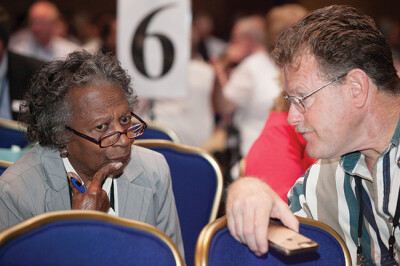Bible study explores disciples making disciples
By Linda Worthington
UMConnection Staff

During a Bible study by the Rev. Steven Manskar,
members were asked to share images of
with one another.
The Bible study at annual
In an overview of Ephesians 4:1-4, 7, 11-16, Manskar showed God’s vision for the church where members are “to demonstrate what reconciliation and real justice look like.”
“The church is the instrument of God’s mission in the world,” he said. “When the world looks at the church, it should get a glimpse of God’s Kingdom.”
Paul, in Ephesians, emphasized the unity of God’s church, the “oneness,” Manskar said: one body, one Spirit, one hope, one Lord, one faith, one baptism
Each local church is like an embassy, Manskar noted, and “when we cross the threshold of an embassy we leave the U.S and enter another country.” He asked, “How does your church serve as an embassy of God’s Kingdom to the neighborhood (world)?”
Christ unites us in faith, hope and the Holy Spirit to go and serve God, he said. We are equipped to do so through the baptismal covenant that is God’s call and claim upon our lives.
“We are called by baptism to be a blessing, to bring the world into God’s Kingdom and to love one another,” Manskar said. The community of the church also makes promises to the newly baptized “to do all in its power to increase our faith, confirm our hope and perfect us in love.”
“Don’t be distracted by the world’s standards of success: increasing numbers, wealth and power. Keep your eyes and your heart on Christ.”
Leadership in the church must be shared, Manskar said, as he interpreted Paul’s letter further, emphasizing that laity, like their pastors, are equipped to be leaders in the church. “Everyone who is baptized is ordained to
“It’s crazy that the pastor should be the (only) one to disciple them,” he said. “Look at Jesus. He
There are no lone-ranger members in the church, he said, and the church’s leadership and mission must be shared. As John Wesley’s famous quote says, “’Holy solitariness’ is a phrase no more consistent with the Gospel than ‘holy adulterers.’”
Manskar, whose two-day Bible study looked at Ephesians 4:11-13 on June 2, examined that text about the five leaders in every church: apostles, to ensure faith is transmitted from one generation to the next; prophets, to bring correction to the culture today; evangelists, who proclaim the good news to the neighborhood and beyond and are bearers of good news to the world; teachers, to instruct in the way of Jesus and keep the congregation centered on Christ; and pastors to care for the community, shepherd the congregation, and tend to pastoral needs.
Who are these five in your congregation? Manskar asked. “Our task as leaders
Manskar, an expert on John Wesley, explained that Wesley’s training of laity was done through weekly “class meetings” led by lay people as class leaders, disciples who could disciple others.
“Class meetings were the community where most people came to Christ,” Manskar said. “(They) were also where the apostles, prophets, evangelists, pastors
He summed up Ephesians 4:1-16 with a verse from a Charles Wesley hymn, p. 561 in the hymnal, “Jesus, United by thy Grace”:
“Help us to build each other up,
Our little stock improve;
Increase our faith, confirm our hope,
And perfect us in love.”
